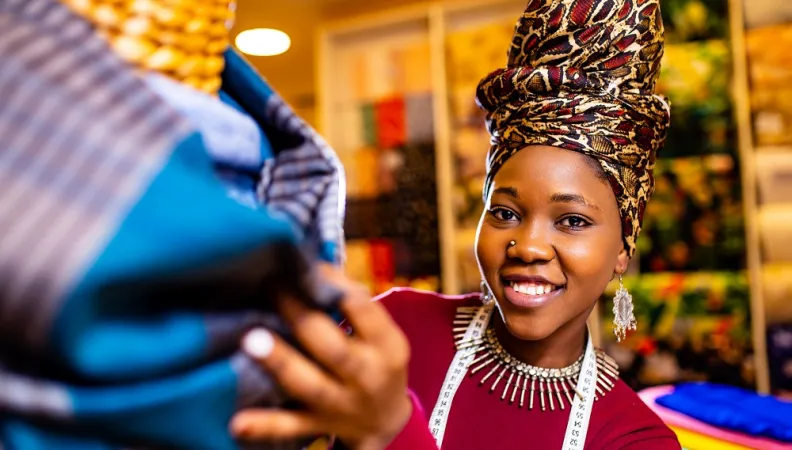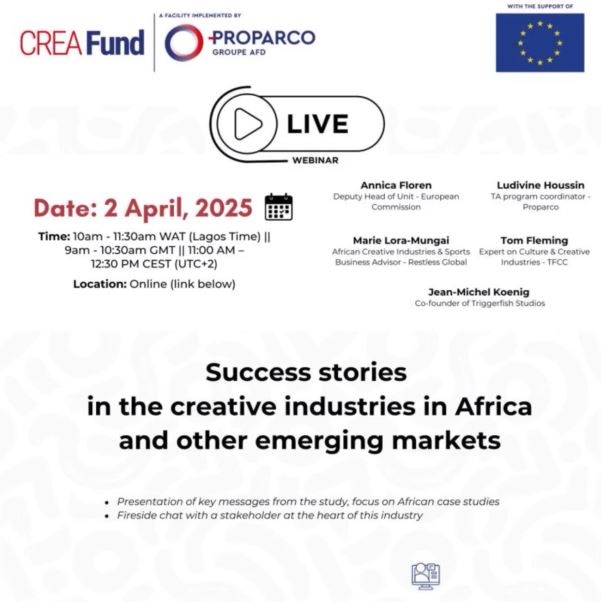Share the page
CREA Fund Facility: The European Union and Proparco catalyse financing for Creative and Cultural Industries in Africa and the Caribbean
Published on

The CREA Fund Facility, supported by the European Union and implemented by Proparco, actively supports the development of creative and cultural industries (CCI) in emerging countries. This initiative falls within the framework of the European Union's CreatiFI program, aimed at stimulating growth, innovation, and job creation in a sector with significant economic and social potential.
The European Union, through its CreatiFI initiative (The Cultural and Creative Industries Financing Initiative), plays a central role in supporting creative and cultural industries (CCI) in emerging countries. In partnership with Proparco, the CREA Fund facility aims to remove structural barriers that hinder the development of this sector, particularly in sub-Saharan Africa and the Caribbean.
The creative economy currently represents approximately 3% of global GDP and generates 30 million jobs, according to UNESCO. Yet, in many emerging countries, CCIs struggle to access the financing necessary for their growth, due to a lack of structuring, training, and qualified sector-specific information. The sectoral specificities of the creative economy, such as the size of its enterprises (often SMEs and start-ups) or the intangible nature of their assets, can prove obstructive for financial intermediaries who lack expertise in this sector.
The CreatiFI program, with a budget of 20 million euros, is a blended finance initiative aimed at mobilizing impact investments in the cultural and creative industries (CCI) of Africa, Caribbean, and Pacific countries. Its main objectives are to improve access to financing, strengthen local financial systems, and facilitate market access by developing the entrepreneurial capacities of different creative sub-sectors.
- Deputy Head of Unit at the European Commission Directorate-General for International Partnerships, Youth, Education & Research, Culture Department

To address this challenge, Proparco has partnered with the European Union since 2022 to launch the CREA Fund. Deployed under the CreatiFI initiative created in 2019 by the European Commission, this facility aims to enhance access to financing for companies in the Creative and Cultural Industries (CCIs) in Sub-Saharan Africa and the Caribbean.
The CREA Fund mechanism is structured around two main support pillars available to Proparco and FISEA partner entities:
- A guarantee of €5 million, designed to cover investments by Proparco and FISEA client funds in creative sector enterprises (more than 50% of their revenue comes from this sector) in Africa and the Caribbean;
- Technical assistance with a budget of €1.47 million, intended for financial intermediary partners of Proparco/FISEA in target countries to enable them to better understand the specificities of Cultural and Creative Industries (notably through dedicated market studies, training, or recourse to sectoral expertise) and/or to support the growth of enterprises they wish to finance.
Two recent EU-supported studies highlight the impact of this approach: one, titled "Success Stories in the Creative Industries in Africa and Other Emerging Markets" analyses the success stories of 12 creative companies from Africa and other emerging markets; the other, "Access to Finance for the Film Industry in the Dominican Republic and Jamaica" explores access to finance for the film industry in the Dominican Republic and Jamaica.
Target Sectors
- Film and television
- Fashion, design, beauty
- Music
- Animation, video games, and digital arts
- Visual arts, museums, galleries
- Publishing (books, comics)
Covered Countries
Angola, Benin, Botswana, Burkina Faso, Burundi, Cameroon, Cape Verde, Central African Republic, Chad, Comoros, Democratic Republic of the Congo, Republic of the Congo, Côte d’Ivoire, Djibouti, Equatorial Guinea, Eritrea, Gabon, Gambia, Ghana, Guinea, Guinea-Bissau, Kenya, Lesotho, Liberia, Madagascar, Malawi, Mali, Mauritius, Mozambique, Namibia, Niger, Nigeria, Rwanda, Senegal, Seychelles, Sierra Leone, Somalia, South Sudan, Sudan, Kingdom of Eswatini, Tanzania, Togo, Uganda, Zambia, Zimbabwe.
More information
Replay webinar: "Success Stories in the Creative Industries in Africa and Other Emerging Markets"
Published on April 29, 2025
Report - Success Stories in the Creative Industries in Africa and other Emerging Markets
Published on April 2, 2025
Report - Access to Finance for the Film Industry in the Dominican Republic and Jamaica
Published on April 2, 2025



